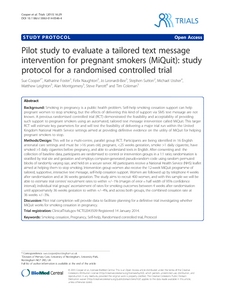Cooper, S; Foster, K; Naughton, F; Leonardi-Bee, J; Sutton, S; Ussher, M; Leighton, M; Montgomery, A; Parrot, S; Coleman, T
(2015)
Pilot study to evaluate a tailored text message intervention for pregnant smokers (MiQuit): study protocol for a randomised controlled trial.
Trials, 16 (1).
ISSN 1745-6215
https://doi.org/10.1186/s13063-014-0546-4
SGUL Authors: Ussher, Michael Henry
![[img]](https://openaccess.sgul.ac.uk/107357/1.hassmallThumbnailVersion/Pilot_study_evaluate_tailored_text_message_intervention_for_pregnant_smokers_MiQuit.pdf)  Preview |
|
["document_typename_application/pdf; charset=binary" not defined]
Published Version
Download (813kB)
| Preview
|
Abstract
Background: Smoking in pregnancy is a public health problem. Self-help smoking cessation support can help
pregnant women to stop smoking, but the effects of delivering this kind of support via SMS text message are not
known. A previous randomised controlled trial (RCT) demonstrated the feasibility and acceptability of providing
such support to pregnant smokers using an automated, tailored text message intervention called MiQuit. This larger RCT will estimate key parameters for and will test the feasibility of delivering a major trial run within the United Kingdom National Health Service settings aimed at providing definitive evidence on the utility of MiQuit for helping pregnant smokers to stop.
Methods/Design: This will be a multi-centre, parallel group RCT. Participants are being identified in 16 English
antenatal care settings and must be >16 years old, pregnant, <25 weeks gestation, smoke >1 daily cigarette, have smoked >5 daily cigarettes before pregnancy, and able to understand texts in English. After consenting and the
collection of baseline data, participants are randomised to control or intervention groups in a 1:1 ratio; randomisation is stratified by trial site and gestation and employs computer-generated pseudo-random code using random permuted blocks of randomly varying size, and held on a secure server. All participants receive a National Health Service (NHS) leaflet aimed at helping them to stop smoking. Intervention group women also receive the 12-week MiQuit programme of tailored, supportive, interactive text message, self-help cessation support. Women are followed up by telephone 4 weeks after randomisation and at 36 weeks gestation. The study aims to recruit 400 women, and with this sample we will be able to estimate trial centres’ recruitment rates to within +/−1% (margin of error = half width of 95% confidence interval); individual trial groups’
ascertainment of rates for smoking outcomes between 4 weeks after randomisation until approximately 36 weeks gestation to within +/−4%, and across both groups, the combined cessation rate at 36 weeks +/−3%.
Discussion: Pilot trial completion will provide data to facilitate planning for a definitive trial investigating whether MiQuit works for smoking cessation in pregnancy.
Trial registration: ClinicalTrials.gov NCT02043509 Registered 14 January 2014.
| Item Type: |
Article
|
| Additional Information: |
© 2015 Cooper et al.; licensee BioMed Central. This is an Open Access article distributed under the terms of the Creative Commons Attribution License (http://creativecommons.org/licenses/by/4.0), which permits unrestricted use, distribution, and reproduction in any medium, provided the original work is properly credited. The Creative Commons Public Domain Dedication waiver (http://creativecommons.org/publicdomain/zero/1.0/) applies to the data made available in this article, unless otherwise stated. |
| Keywords: |
Smoking cessation, Pregnancy, Self-help, Randomised controlled trial, Protocol, General & Internal Medicine, 1102 Cardiovascular Medicine And Haematology, 1103 Clinical Sciences |
| SGUL Research Institute / Research Centre: |
Academic Structure > Population Health Research Institute (INPH) |
| Journal or Publication Title: |
Trials |
| Article Number: |
29 |
| ISSN: |
1745-6215 |
| Language: |
ENG |
| PubMed ID: |
25622639 |
| Dates: |
| Date |
Event |
| 2015-01-27 |
Published |
|
 |
Go to PubMed abstract |
| URI: |
https://openaccess.sgul.ac.uk/id/eprint/107357 |
| Publisher's version: |
https://doi.org/10.1186/s13063-014-0546-4 |
Statistics
Item downloaded times since 06 Mar 2015.
Actions (login required)
 |
Edit Item |



